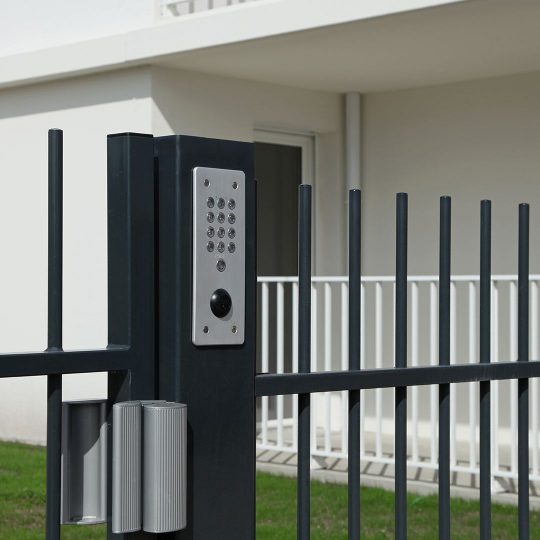5 Common Questions about Gates and Gate Operators

Thinking about installing a gate for your home or office? Don’t know where to start? Here are five common questions when it comes to types of security gates and gate operators.
1. Why do I need a gate?
From security purposes to pure aesthetics, people pick different types of gates for a variety of reasons. This reason will help determine the size, function, and materials needed for design.
If security is the main goal, you need a strong and stable gate. A sliding metal gate connected to a remote gate operator with a security camera is one secure option.
If farming and keeping animals wrangled is more your desire, the gate should be designed so nothing easily escapes. A tube swing gate can help you enter the corral while keeping the animals safely inside.
Gates built purely for landscaping or privacy purposes have more of an artistic design, and don’t necessarily need to be as secure. Wooden gates are a popular option for their easy customization.
2. What are gates made of?
Tubes. It’s strong, durable, and without sharp edges to catch on anyone or anything. The tubes can be lightweight aluminum or heavier steel.
Wood. Whether painted, stained, or natural new or reclaimed wood, there’s a wide variety available. This material requires additional upkeep to prevent rotting or to make repairs.
Metal. Aluminum, steel, iron—all of these sturdy materials can create highly functional gates with both artistic design and security in mind. They will need to be maintained properly to prevent rust, and can be costly depending on the grade purchased.
3. How do gate operators function?
Do you want your gate to swing or slide open manually or automatically? Manual operation is easy with lighter materials. Automated gate operators require an electric control system that you can set up through your home phone system and via remote. Typically, the main power is drawn from your home, and a backup battery or solar-powered system maintains the connection if the power goes out. Here are some options to keep in mind:
Slide Gate:
- runs parallel to your fence or entrance
- needs a clean track and rollers to function properly
- mounting and operation costs more
- saves space; requires little room to operate, but the ground has to be level for gate to slide freely
Swing Gate:
- less expensive than a sliding gate
- only need hinges to install
- maintenance-free, especially if it’s a manual gate
- no motor or electronics to malfunction
- takes up more space to function properly
Remote Access Gates:
- access codes via keypad or card
- install cameras to see who’s there
- answer from smartphone apps
- manage codes and notifications online
4. How secure are they?
Security depends on the size, material, and access control you put in place. Sometimes, just seeing a gate in front of a home can deter thieves from entering. The stronger the material, the more secure it can be. When it’s hooked up to a home security system or company access code program, the gate can also be more secure.
5. How much are they?
The cost also depends on the type and size of gate you design:
- Size. The bigger the gate, the more expensive.
- Material. Wood is cheaper than metal.
- Hardware. Hinges, latches, and any gate operating mechanism could cost you more.
- Labor. If you want the job done right, you may want to call in the professionals to install the gate and operator.
No matter what gate and operating system you choose, safe installation and maintenance should be top priority. If you decide to go the automated route, you’ll need a professional to set up the electrical components of your gate. They will also have the heavy equipment available to install an oversized gate, whether it’s made of metal or wood. Truly investing in a security gate means having it securely installed. A professional will ensure all features work properly, from the gate functions to the operating system. Call the Security Five specialists at 610-323-9511 with any additional questions about gate operators.